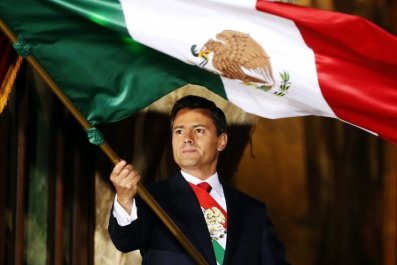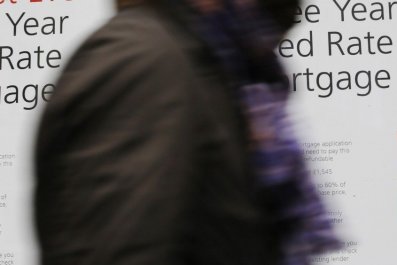Has it ever occurred to you to negotiate with the pilot of the plane you just boarded about her pay?
Assuming the pilot was willing to take bids for her services, would you have any idea of how to evaluate the worth of that particular pilot compared to anyone else who might be at the controls? How long would it delay the flight while you and other passengers haggled over that fee?
And what of the risks in having a pilot focused on whether she negotiated good deals with her passengers, rather than getting everyone safely to their destination?
While haggling with pilots is absurd, the idea that individual Americans should negotiate the prices each pays for health care is getting a lot of serious discussion right now. The reason is the Affordable Care Act, a.k.a. Obamacare, which critics are desperate to find some way to stop.
For weeks, politicians and writers in the opinion pages of The Wall Street Journal and other critical outlets have declared Obamacare a failure with plenty of victims. Those are silly assertions because the law only took effect this week, on the first day of 2014.
These critics are all outrage with no detailed alternatives, except the mantra that competition will magically bring down health-care costs. The libertarians at the Cato Institute argue "we need market competition more than ever. Not the mealymouthed substitutes bandied about by most health policy wonks. We need something that none of us has ever seen - real competition in a free health-care market."
No. We need something easier, simpler, and already proven to cut costs.
For starters, markets can push prices up as well as down. The electricity market rules, initially written by Enron (at the urging of former Vice President Dick Cheney, who was pals with the company's late founder), can raise prices to 90 percent of what an unfettered monopolist could charge, as I showed in my book Free Lunch, citing research by Professor Sarosh Talukdar of Carnegie-Mellon University that no one has challenged.
Then there's the knowledge component of markets. When one side knows and the other side is ignorant, you get price-gouging. Under current policies, prices for medical services are generally confidential. You could call hospitals and your health insurer to ask the cost of a standard medical procedure, say cataract or gall-bladder surgery. I tried that, and was told at every turn that prices were proprietary information - none of my business, until I got a bill.
More than four decades ago the Supreme Court defined a fair market as the "price at which the property would change hands between a willing buyer and a willing seller, neither being under any compulsion to buy or to sell and both having reasonable knowledge of relevant facts." How many of us have "reasonable knowledge" of medical procedures, costs, or even the difference between a neurologist and a nephrologist?
Is an accident victim writhing in pain, life's blood flowing out of his body, free of compulsion?
And how many of us know the assortment of facts needed to price an MRI, an angiogram or just a dozen stitches? Or, for that matter, whether any of those procedures is the best alternative, or even necessary?
We don't have a free market for health-care services. If we did, we would see a narrow range of prices for the same service. After all, a Ford F-150 pickup with the same options costs about the same in Washington, West Virginia, or Wyoming. Not so hospital and medical costs, a fact brought home in the 2012 Pricing Report of the International Federation of Health Plans, a trade association for health insurance companies.
While the average U.S. hospital stay is just under $4,300 per day, one in four patients are charged $1,514 or less and one in 20 pay $12,537 or more.
The total cost for an appendectomy ranges from $8,156 for a fourth of these procedures to more than $29,426 for the most expensive 5 percent. The average cost is $13,851.
Economists learn before they get their undergraduate degrees that such huge variations are signs of inefficient markets or even faux markets. Such wide price variations may even indicate collusion among some providers to jack up prices, which is generally illegal.
But even if we ignore these huge price variations, the trade industry report illustrates another problem: American health-care costs are completely out of line with the rest of the modern world.
In France the average daily cost of a hospital stay is $853; in the U.S., it's $4,287.
An MRI costs on average $335 in Britain and $363 in France, but $1,121 in the U.S.
Routine and normal childbirth costs, on average: $2,641 in Britain and $3,541 in France but in the U.S. averages $9,775. Caesarean section delivery runs $4,435 in Britain, $6,441 in France; $15,041 in the U.S.
This pattern holds for all 21 procedures examined in the report.
Excessive health-care costs drain both the public purse and private purses, make manufacturing uncompetitive and force employers to divert attention from running their firms to dealing with health insurers.
Our universal single-payer health-care plan for older Americans, Medicare, has lower costs and lower overhead than the system serving those under age 65. If everyone in the U.S. was on Medicare, the savings would move the federal budget from deficit to surplus.
Of the 34 modern economies, the U.S. has by far the costliest health care system. For each dollar per capita that the other 33 economies spend on health care the U.S. spends $2.64, my analysis of Organization for Economic Cooperation and Development data shows.
Canada, Germany, and France each spend about 11.5 percent of their economy on health care, compared to 17.6 percent in the U.S.
We could have eliminated the income tax in 2010 had we adopted the Canadian, German, or French health-care systems.
Look at your pay stub and how much goes to federal income taxes, then think about the unnecessary economic pain American health care causes you.
One important distinction between other modern countries and the United States is that they all provide universal health care, while 48 million Americans had no health insurance in 2012 and another 30 million had coverage for only part of the year. Millions have coverage riddled with loopholes and exceptions, not paying for such vital services as an ambulance, even when the patient is unconscious. And all private health insurers try to avoid paying claims in various ways, from requiring onerous paperwork to denying a procedure was necessary.
On top of all this are restraints on trade in American medicine, like limiting the supply of doctors and nurses. The American Medical Association has acknowledged that it worked to hold down the number of physicians to push up income for doctors. Under state licensing rules, many of even the best-trained foreign doctors cannot practice here.
And then there are the drug and other medical patents. Economist Dean Baker notes that in America, "we grant patents to providers and then let them charge pretty much whatever they want, while other countries also grant patents, but then limit the prices charged."
When a patent expires, American law allows the drug company to pay would-be makers of generic versions to not produce the drug. That keeps prices, and profits, high. It ought to be illegal.
Congress expressly forbids Medicare from negotiating wholesale price discounts for the Medicare Part D program initiated by President George W. Bush, so Americans pay far more for drugs available in other countries, which negotiate huge discounts.
Finally, not everything should be judged by price competition. The love and affection of our families, the loyalty of our diplomats, and the integrity of jetliner makers and of the airlines that hire pilots are not matters for market economics.
We could experiment with the kind of price competition that the Cato Institute proposes. It might even work, though I doubt it. But why? We already know that universal coverage with a single payer is much cheaper than what America spends now. And we know that the quality of U.S. health care is far from the best - 37th in the world, according to the World Health Organization, which ranks France No. 1.
When opponents of the Affordable Care Act argue for patients negotiating health-care prices they make as much sense as proposing that passengers haggle over pay with an airline pilot.
























